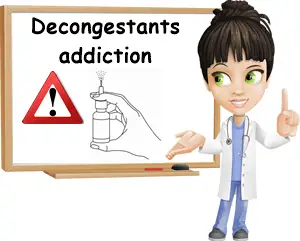For many people, nasal decongestants are synonymous with recovery from the common cold, flu or other respiratory infections. Nasal sprays in particular are sought after for the quick relief they offer, allowing one to proceed with normal activities as if congestion had never been an issue. However, the decongestants we so often rely on are not harmless medication considering they are full of side effects and can easily encourage addiction.
The addiction they cause is fueled by our need for easy solutions to congestion and our reliance on the efficacy of such products because, truth be told, decongestants are efficient. But if we had to get through nasal congestion without their help, could we? We probably couldn’t and wouldn’t want to do so, particularly if we have been using them for some time. In addition to feeding our need for fast results, decongestants produce physical changes in our body that encourage their continual use, ultimately leading to addiction.

Having a stuffy nose is one of the most distressing feelings ever because it prevents us from enjoying life by limiting an essential function: normal breathing. So we use nasal decongestants. Their long list of side effects does not seem to worry us very much because we never think they can occur to us and if we were to experience side effects as a result of decongestants use, we would surely notice and discontinue use. Flawless reason, right? Well, not so flawless.
First of all, many people do not know the side effects of nasal decongestant use so they might not know when it’s time to stop using them. Secondly, many people use them more than they should because, sometimes, congestion is more stubborn than we’d wish. Thirdly, our body builds tolerance to the active ingredients in many pharmaceuticals which means that they become less efficient over time and, as a result, we are tempted to use more of them for longer periods of time than we are supposed to.
Lastly, decongestants give us rebound congestion, meaning that as soon as we stop using them, our nose might get stuffy again so, naturally, we would have to resume use. Notice the vicious circle we are drawn into? And then life happens and we no longer have time to address the issue properly and just go with the flow. And this is how decongestant addiction occurs. Breaking this vicious cycle is not easy, but addiction is even harder to break, particularly when the time comes that our body no longer feels well on decongestants and serious side effects ensue.

What is in nasal decongestants?
Understanding how nasal decongestants work is important to preventing such infelicitous outcomes. Knowing what ingredients they contain is a first step to understanding their mechanism of action and the reason they may lead to an addiction. Common active ingredients in nasal decongestants include:
- Imidazoline
- Naphazoline
- Oxymetazoline
- Phenylephrine
- Xylometazoline
How nasal decongestants work
Important points to consider with regards to their mechanism of action:
Rebound congestion
Treatment beyond three days with any of these decongestants can lead to a condition called rebound congestion which causes our nose to get stuffy again. In other words, we use nasal decongestants to relieve congestion, but we are very likely to get congestion as a side effect. At this point, congested or not, we have to discontinue them for fear of never being able to get rid of congestion.
Shrinking of blood vessels
All of these compounds are vasoconstrictors, meaning they promote blood vessel shrinking. This leads to reduced blood flow and swelling. Nasal congestion itself is caused by allergens or pathogens (bacteria, viruses or fungi in the nose) which produce damage, urging an inflammatory response from the immune system that also causes an increase in mucus secretion and a thickening of the mucosa. By constricting blood vessels in the nose, decongestants reduce inflammation and provide relief.
However, most of the time, decongestants drip from our nose down our throat, we swallow them and they reach our stomach and, from there, the bloodstream. Decongestant tablets end up in the same place too. Their action is thus not limited to our nose alone and vasoconstriction can occur throughout our circulatory system (the more product we use, the more compounds in our system), hence the risk for serious side effects such as hypertension, stroke or palpitations, arrhythmia etc.
Consider someone who has been using decongestants for years. Won’t the side effects of long-term use be more pregnant? Even more, doesn’t the rebound effect encourage continual use of nasal decongestants? And doesn’t this promote continual reliance on the product?
How to stop using nasal decongestants
Giving up nasal decongestants after using them for very long can be difficult. A few years back I suffered from a nasty flu virus that kept me in bed for about 3 weeks. Naturally, I was so congested I couldn’t even imagine not using a nasal decongestant spray. But its rebound effect and the lengthiness of the flu had me using the decongestant for more than two months. And it came to the point that I couldn’t eat well, sleep or go about my day without using a decongestant.
I suffered from side effects such as light sensitivity, fear and anxiety (I was constantly worried about what would happen if I ran out of nasal spray). I had developed a sore throat and hoarseness and had headaches all the time. Realizing how unhealthy this behavior was and what it was doing to me, I one day just said ‘no more’.
The congestion wasn’t as bad as giving up the decongestant. But I persevered and told myself I still had a mouth to breathe through, I could still eat, but slower, I could still sleep, just not as much as I would have liked to, and my congestion would still go away, despite not using my spray. I just had to wait. And it all paid off because I have never used or felt the need to use nasal decongestants from that point on.
Even more, having to relieve my congestion with the help of natural remedies taught me that their effect, though not as potent at first, was long-term and free of side effects. Here are 7 things I did to stop using nasal decongestants:
Drank plenty of water
I always had a bottle of water with me, day and night and kept taking sips of it. Two days into this I could blow my nose easily and enjoy relief from congestion.
Drank herbal teas
I drank 15-20 minutes Rooibos tea before lunch and mint and chamomile tea before bed. This kept me hydrated and the warm infusions helped relieve some of the congestion. Result improved over the course of a couple of weeks.
Took lemon, honey and propolis cough drops
Because I was breathing by mouth for so long, I took natural cough drops with lemon, honey and propolis to help reduce hoarseness and the sore throat sensation I was experiencing.
Ate ginger and turmeric
I started adding small amounts of either ginger and turmeric to every dish I ate. The spices have powerful anti-inflammatory properties which I feel contributed to my recovery.
Took a multivitamin supplement
During my recovery, I started taking Supradyn Energy, a multivitamin with particularly high amounts of all the essential nutrients as well as Coenzyme Q10. I have continued to take this multivitamin complex and have noticed a great improvement in my overall health in the following months. Indeed, taking vitamins for nose health was a good approach.
Made some dietary changes
My congestion was terrible during the first few days off decongestants so I used a blender to make it soft and ready to swallow. This helped me immensely and took a lot of pressure off eating with a stuffy nose.
Waited and persevered
Perseverance is the key to everything. It may be hard to endure nasal congestion and, at times, incredibly frustrating to not be able to simply take a deep breath or enjoy a nice meal. But the reward of knowing you can do all of that and never have to rely on decongestants again is incredibly empowering and something to take great pride in because it shows character strength and perseverance.
